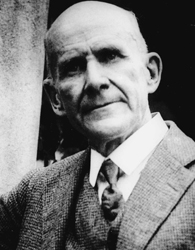Eugene V. Debs spearheaded labor movements, led the American Socialist Party and is remembered today for being an agitator who never shied from passionately expressing his opinions—even when it led to his arrest.
Eugene V. Debs’ Early Days
Born November 5, 1855, in Terre Haute, Indiana, Eugene Victor Debs was the third of six children born to Jean Daniel and Marguerite Marie Bettrich Debs. His parents, immigrants from the province of Alsace along the France-Germany border, named him after their two favorite writers—Eugene Sue and Victor Hugo.
Although his parents had arrived penniless in the United States years before, during Debs’ childhood they were able to use their meager savings to open a butcher shop. Debs enjoyed a middle-class life of hunting and fishing; he attended a private school for a short while before enrolling in public school, where he stayed until he was 14.
At 14, Debs dropped out of school to work at the railroad yards, where he earned 50 cents a day scraping paint and grease from locomotives. Five years later, he became a locomotive fireman, a job that worried his mother but fueled his sense of adventure.
Sources in this Story
- Biography.com: Eugene V(ictor) Debs Biography (1855–1926)
- Monthly Labor Review: Eugene V. Debs: an American Paradox
- Illinois Historical Digitization Projects: The Pullman Strike: Eugene V. Debs: Strike Leader and Socialist
- Time magazine: Eugene V. Debs
- Marxists Internet Archive: Eugene V. Debs Internet Archive
- AFL-CIO: Eugene Victor Debs (1855–1926)
- Marxists Internet Archive: The Canton, Ohio, Anti-War Speech
- Eugene V. Debs Foundation: Personal History
Debs’ Notable Accomplishments
The Brotherhood of Locomotive Firemen, a newly formed union, attracted Debs’s attention in 1875; soon after joining, he began to serve as an organizer and recording secretary. In a few years he moved quickly through their ranks; he was elected associate editor of the Firemen’s Magazine, national secretary-treasurer of the union and ultimately, editor of the magazine.
During this time, Debs also attained positions of political leadership. He was elected city clerk in Terre Haute in 1879; after two terms, he ran for state legislature. He was elected in 1884 and served one term as a Democrat before declining to run, stating he was not effective in office.
Long after leaving the railroad, Debs continued his involvement with that union and began to help organize local chapters of other labor unions for railroad workers as well as painters and carpenters. In 1893, he founded his own union, the American Railway Union, which quickly signed up thousands of members. After successfully striking against the Great Northern Railroad in 1894, union members decided to support striking Pullman Palace Car workers by boycotting the Pullman cars on all union lines.
The resulting strike, which Debs initially opposed, shut down a good deal of commerce and even delayed the U.S. Postal Service. President Grover Cleveland ordered the army to intervene, and the resulting riots led to 30 deaths and many more were harmed. Debs was sent to prison for six months at Woodstock, Illinois, for his role in the strike.
While in jail, Debs was visited by future Congressman Victor Berger, who left behind a pamphlet on socialism. Debs became convinced that labor unions could not truly protect the needs of the working person and he became a socialist.
After his release, Debs founded the Social Democratic Party of America, which would in 1900 become the Socialist Party of America. Many who had admired his strength as a union leader joined his party. Debs became the party’s perennial presidential candidate, waging loud campaigns he did not intend to win as a mechanism for spreading his message on the dangers of unbridled capitalism. He also organized the Industrial Workers of the World (IWW); popularly known as the “Wobblies,” this all-inclusive union was intended to employ mass strikes to take control of industries.
In 1918, two years after a failed bid for Congress, Debs made a famous speech in Canton, Ohio, protesting World War I. In it, he called for an end to fighting and drafts. Despite his careful wording, he was arrested and charged under an anti-espionage law. After a court appearance in which he served as his own lawyer, he was sentenced to 10 years in prison and his citizenship was revoked.
While in prison, Debs made his most successful bid for president, receiving nearly a million votes (six percent of the popular vote) from inside his jail cell.
The Man and his Work
- “Eugene V. Debs Speaks”
- “Walls & Bars: Prisons & Prison Life in the ‘Land Of The Free’”
- “Democracy’s Prisoner: Eugene V. Debs, the Great War, and the Right to Dissent” by Ernest Freeberg
- “Eugene V. Debs: Citizen and Socialist” by Nick Salvatore
- “The Bending Cross: A Biography of Eugene Victor Debs” by Ray Ginger
The Rest of the Story
Debs grew ill in prison and although he appealed his conviction to the Supreme Court, he remained in captivity. President Woodrow Wilson denied an initial request for clemency, but President Warren G. Harding commuted his sentence after Debs served three years.
After being nominated for the Nobel Peace Prize in 1924 for his protest of the war, Debs’ health quickly declined. He was admitted to an Elmhurst, Illinois sanitarium where he died at the age of 70 on October 20, 1926.
This article was originally written by Jennifer Ferris; it was updated November 1, 2017.











